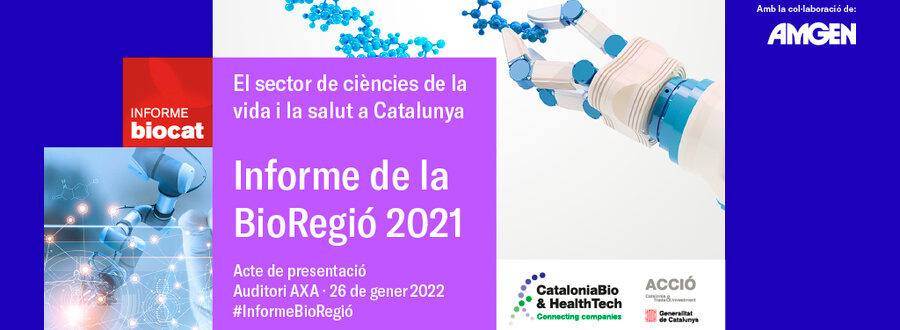
Investment in health startups in the BioRegion of Catalonia tops €200 million again in 2021
Investment in health startups in Catalonia continues to grow and again surpassed the €200 million mark for the second year in a row, despite the COVID-19 pandemic, according to the 2021 BioRegion Report promoted by Biocat, with CataloniaBio & HealthTech and ACCIÓ. In total, companies raised €238 million, the most to date. Venture capital funding was the main driver of this growth, with more than €187 million, or 79% of all capital, three times as much as in 2019.
The report was presented this morning in a hybrid format, in person at the AXA auditorium (Barcelona) and live streaming. The event, closed by the president of the Government of Catalonia, Pere Aragonès, was attended by Robert Fabregat, Biocat CEO; Jaume Amat, president of CataloniaBio & HealthTech; Silvia Ondategui, Life Sciences partner at Ernst & Young; and Natàlia Mas, CEO of ACCIÓ and director general of Industry for the Government of Catalonia.
A growing sector, despite the pandemic
The 2021 compiles the main indicators on health innovation and macroeconomic data on the healthcare and life sciences sector in Catalonia, updated in December 2021, including investment numbers. In total, companies raised €238 million, the most to date. Venture capital funding was the main driver of this growth, with more than €187 million, or 79% of all capital, three times as much as in 2019.
83% of the venture capital raised was in operations with international investors. In fact, more than 90% of operations worth over €10 million are syndicated (shared) among investors established in the BioRegion and international investors. In this regard, there were nearly a hundred international investors in total that took part in rounds of investment, almost twice as many as in 2019. They are mainly from Europe (51) and the United States (31), including noteworthy firms and international corporate ventures like Boheringer, Kurma Partners, Idinvest, Pontifax, Roche and Wellington.
In 2021, a total of 36 operations were closed, fewer than the previous year (41) but worth more each on average. It is worth noting once again the investment channeled through crowdequity platforms, which has been more than €10 million a year since 2019.
Regarding the investment trend, 2021 stood out for the increased investment in medical technology, which was 2.4 times more than in 2020. This increase was mainly due to two important venture capital operations: €41 million invested in Impress in what is currently the largest round the BioRegion has ever seen, and the €25 million attracted by Corus Dental, both companies that work in dental health. Furthermore, digital health companies have seen nearly twice as much investment as in 2020, consolidating the increase in funds raised for the fifth year in a row with over €60 million.
“Without a doubt, 2021 was an exceptional year,” says Biocat CEO Robert Fabregat. “The ecosystem has continued growing despite the pandemic, generating highly valuable research and innovation and attracting local and international investment. We have to channel our efforts into facilitating technology adoption by the system and taking advantage of the exponential growth of companies working in emerging therapies and transformative technology and digital health in order to accelerate their direct impact on people’s health and wellbeing.”
The startup creation rate in recent years has been one new company per week, with a noteworthy increase in new biotechnology firms working on therapies, up 31% since 2018.
The Report also associates creation and investment for this type of companies, noteworthy among which are the 24 with an ICREA researcher that through 2021 have received a total investment of €184 million: up 50% from the previous year (€120 million).
In the section on large operations, although there weren’t any companies that went public last year, it is worth noting the number of local businesses acquired by other companies, mainly from the US, including GoodGut, a spinoff of UdG and IDIBGI that was acquired by Catalan pharmaceutical company HIPRA. “This operation is a clear example of cooperation among companies and of the driving role that consolidated businesses in the Catalan ecosystem must play in order to continue bringing innovative solutions to patients and the healthcare system,” says CataloniaBio & HealthTech president Jaume Amat.
The 2021 Report also looks at other macroeconomic and innovation indicators for the life sciences and healthcare sector, including companies’ turnover and employment figures, which are up despite the pandemic and have had an impact on the sector’s GDP, now 8.7% of the Catalan GDP (up 1.4% from 2018). The sector has over 1,300 companies, which export over 50% of all life sciences and healthcare products from Spain, employs 244,000 people (more than 8% of the working population of Catalonia) and is consolidating its place as one of the most attractive hubs in Europe with international innovation centers arriving on a regular basis.
In this regard, as announced by director general of Industry and CEO of ACCIÓ Natàlia Mas, “Catalonia has attracted over €700 million in foreign direct investment (fDi Markets) over the past five years in the life sciences and healthcare arena, mainly from Germany, the United States, France and Japan. This foreign investment has translated into 3,000 new qualified jobs. All in all, Mas summed up that the Report shows “Catalonia is a unique setting in Europe given its combination of a strong local industrial fabric in healthcare and the life sciences, an ecosystem of cutting-edge startups, benchmark multinational corporations in this arena and a strong network of research bodies.”
» More information: Biocat website [+] CataloniaBio & HealthTech website [+]




